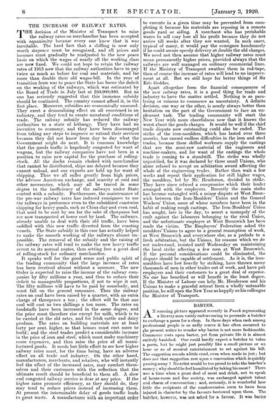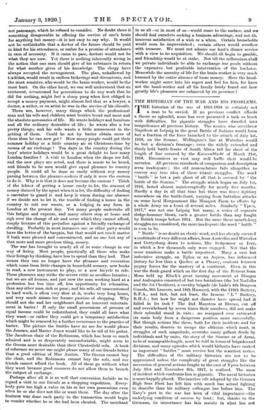BARTER.
AN amusing picture appeared recently in Punch representing a literary man vainly endeavouring to persuade a butcher to exchange a poem for a ()hop. In these days when cash among professional people is so sadly scarce it has often occurred to the present writer to wonder why barter is not more fashionable. Commerce rests upon barter, yet from private life it is almost entirely banished. One could hardly expect a butcher to value a poem, but he might just possibly like a small picture or as hour or so of musical entertainment to set against his bill. The suggestion sounds a little cruel, even when made in jest; but does not that suggestion rest upon a convention which is quickly passing away ? No artist would be too proud to take the butcher's money ; why should he feel humiliated by taking his meat ? There was a time when a great deal of meat and drink, not to speak of house-room and fine society, was exchanged against talent and charm of conversation ; and, seriously, it is wonderful how little the recipients of the condescension seem to have been injured in character by the favours bestowed upon them. Tho butcher, however, was not asked for a favour. It was barter not patronage, which he refused to consider. No doubt there is something disagreeable in offering the service of one's brain for anything but money—it is not easy to say why. It would not be unthinkable that a doctor of the future should be paid in kind, for his attendance, or rather for a promise of attendance in ease of necessity. If it came to pass, doctors would not be what they are now. Yet there is nothing inherently wrong in the notion that one man should give of his substance in return for what another gives of his knowledge. The clergy have always accepted the arrangement. The plan, unhallowed by tradition, would result in endless biokerings and discontents, and the most sensitive, who would be the brain-worker, would be the most hurt. On the other hand, we can well understand that an arietoorat, accustomed for generations to do any work that he did for nothing, might feel a sharp pang when first obliged to accept a money payment, might almost feel that as a lawyer, a doctor, a writer, or an artist he was in the service of his clientele.
There are, however, many things which the professional man and his wife and children want besides bread and meat and the absolute necessaries of life. He wants holidays and furniture and all the ordinary desirables of life ; he wants also a few pretty things; and his wife wants a little amusement in the getting of them. Could he not by barter obtain more of these than ho can now get ? How many people could get their summer holiday or a little country air at Christmas-time by means of an exchange ? Ten days in the country during the boys' winter holidays would be a great delight to how many London families ? A visit to London when the shops are full, and the new plays are acted, and there is music to be heard, and friends to be seen would give equal pleasure to country people. It could all be done so easily without any money passing between the pleasure-seekers if only it were the custom to do it. Why is it that it does not become the custom ? Think of the labour of getting a house ready to let, the amount of money claimed by the agent when it is let, the difficulty of finding a caretaker to guard it and keep it warm during our absence if we decide not to let it, the trouble of finding a house in the country to suit our wants, or a lodging in any form in London at the present day. Yet many people undertake all this fatigue and expense, and many others stop at home and sigh over the change of air and scene which they cannot afford, simply because of this prejudice against a friendly exchange of dwelling. Probably in most instances one or other party would have the better of the bargain, but that would not much matter if both were pleased and convenienced, and no one lost any of that more and more precious thing, money.
The war has brought to nearly all of us some change in our way of living. Most people, practically all those who make their livings by thinking, have less to spend than they had. That means they can no longer have the pleasure and recreation which come from little changes in household scenery, new books to read, a new instrument to play, or a new bicycle to ride. These pleasures may strike the severe critic as needless luxuries ; but we are all human, and just now the man working hard at a profession has less time off, less opportunity for relaxation, than any other man, rich or poor ; and his wife, all unaccustomed to hard work, is often very slow at it, works very long hours, and very much misses her former pastime of shopping. Why should not she and her neighbours find an innocent entertain.. ment in barter ! If only the small possessions of persons of equal income could be redistributed, they could all have what they want—or rather they could get a temporary satisfaction which might be renewed by a further recurrence to the practice of barter. The picture the Smiths have no use for would please the Joneses, and Master Jones would like to be rid of his guitar. The Jacobean chair of the Robinsons, which has been so much admired and is so desperately uncomfortable, might seem to the Greens more desirable than their Chesterfield sofa. A book of reference we never use might please many of our friends better than a good edition of Miss Austen. The Greens cannot buy the chair, and the Robinsons cannot buy the sofa, and our friends cannot afford the book. All of them go without what they want because good manners do not allow them to broach the subject of exchange.
Perhaps after all it is as well that convention forbids us to regard a visit to our friends as a shopping expedition. Every- body puts too high a value on his or her own possessions even when he or she does not like or want them. The day after the business was done each party to the transaction would begin to wonder whether he or she had been cheated. The merchant in us all—or in most of us—would come to the surface, and we should find ourselves seeking a business advantage, and not th. innocent satisfaction of a wish or a whim. Certain households would soon be impoverished ; certain others would overflow with treasure. We must not admire our host's dinner service with a view to its acquisition. We should all begin to gamble, and friendship would be at stake. Not till the millennium shall we private individuals be able to exchange our goods without the expensive but profitable intervention of the huckster. Meanwhile the amenity of life for the brain-worker is very much lessened by the entire absence of loose money. Here the hand- worker might enter into his regret and feel for him, for have not the hand-worker and all his family lately found out how greatly life's pleasures are enhanced by its presence ?











































 Previous page
Previous page